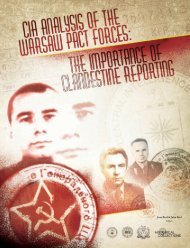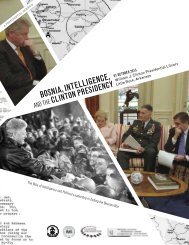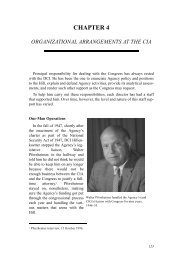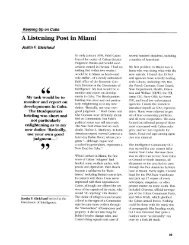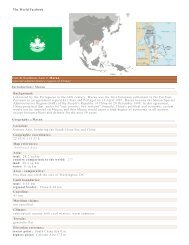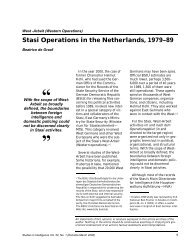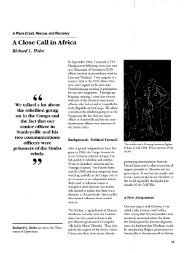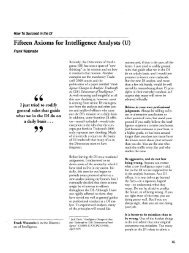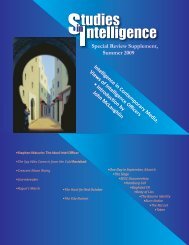Analytic Culture in the U.S. Intelligence Community (PDF) - CIA
Analytic Culture in the U.S. Intelligence Community (PDF) - CIA
Analytic Culture in the U.S. Intelligence Community (PDF) - CIA
Create successful ePaper yourself
Turn your PDF publications into a flip-book with our unique Google optimized e-Paper software.
CHAPTER FIVE<br />
<strong>the</strong> same objects accord<strong>in</strong>g to <strong>the</strong>ir function or utility. Experts comprehend <strong>the</strong><br />
mean<strong>in</strong>g of data better than novices, and <strong>the</strong>y weigh variables with different<br />
criteria with<strong>in</strong> <strong>the</strong>ir doma<strong>in</strong>s better. Experts recognize variables that have <strong>the</strong><br />
largest <strong>in</strong>fluence on a particular problem and focus <strong>the</strong>ir attention on those<br />
variables.<br />
Experts have better doma<strong>in</strong>-specific short-term and long-term memory than<br />
do novices. 9 Moreover, experts perform tasks <strong>in</strong> <strong>the</strong>ir doma<strong>in</strong>s faster than novices<br />
and commit fewer errors while solv<strong>in</strong>g problems. 10 Interest<strong>in</strong>gly, experts<br />
also go about solv<strong>in</strong>g problems differently. At <strong>the</strong> beg<strong>in</strong>n<strong>in</strong>g of a task, experts<br />
spend more time th<strong>in</strong>k<strong>in</strong>g about a problem than do novices, who immediately<br />
seek to f<strong>in</strong>d a solution. 11 Experts use <strong>the</strong>ir knowledge of previous cases as context<br />
for creat<strong>in</strong>g mental models to solve given problems. 12<br />
Because <strong>the</strong>y are better at self-monitor<strong>in</strong>g than novices, experts are more<br />
aware of <strong>in</strong>stances where <strong>the</strong>y have committed errors or failed to understand a<br />
problem. 13 They check <strong>the</strong>ir solutions more often and recognize when <strong>the</strong>y<br />
are miss<strong>in</strong>g <strong>in</strong>formation necessary for solv<strong>in</strong>g a problem. 14 Experts are aware<br />
of <strong>the</strong> limits of <strong>the</strong>ir knowledge and apply <strong>the</strong>ir doma<strong>in</strong>’s heuristics to solve<br />
problems that fall outside of <strong>the</strong>ir experience base.<br />
The Paradox of Expertise<br />
The strengths of expertise can also be weaknesses. 15 Although one would<br />
expect experts to be good forecasters, <strong>the</strong>y are not particularly good at it.<br />
Researchers have been test<strong>in</strong>g <strong>the</strong> ability of experts to make forecasts s<strong>in</strong>ce<br />
<strong>the</strong> 1930s. 16 The performance of experts has been tested aga<strong>in</strong>st Bayesian<br />
probabilities to determ<strong>in</strong>e if <strong>the</strong>y are better at mak<strong>in</strong>g predictions than simple<br />
statistical models. Seventy years later, after more than 200 hundred experiments<br />
<strong>in</strong> different doma<strong>in</strong>s, it is clear that <strong>the</strong> answer is no. 17 Supplied with an<br />
equal amount of data about a particular case, Bayesian probability data are as<br />
8<br />
M. Chi, P. Feltovich, and R. Glaser, “Categorization and Representation of Physics Problems by<br />
Experts and Novices”; M. Weiser and J. Shertz, “Programm<strong>in</strong>g Problem Representation <strong>in</strong> Novice<br />
and Expert Programmers.”<br />
9<br />
W. Chase and K. Ericsson, “Skill and Work<strong>in</strong>g Memory.”<br />
10<br />
W. Chase, “Spatial Representations of Taxi Drivers.”<br />
11<br />
J. Paige and H. Simon, “Cognition Processes <strong>in</strong> Solv<strong>in</strong>g Algebra Word Problems.”<br />
12<br />
Voss and Post.<br />
13<br />
M. Chi, R. Glaser, and E. Rees, “Expertise <strong>in</strong> Problem Solv<strong>in</strong>g”; D. Simon and H. Simon,<br />
“Individual Differences <strong>in</strong> Solv<strong>in</strong>g Physics Problems.”<br />
14<br />
J. Lark<strong>in</strong>, “The Role of Problem Representation <strong>in</strong> Physics.”<br />
15<br />
C. Camerer and E. Johnson, “The Process-Performance Paradox <strong>in</strong> Expert Judgment.”<br />
16<br />
H. Reichenbach, Experience and Prediction; T. Sarb<strong>in</strong>, “A Contribution to <strong>the</strong> Study of Actuarial<br />
and Individual Methods of Prediction.”<br />
64



